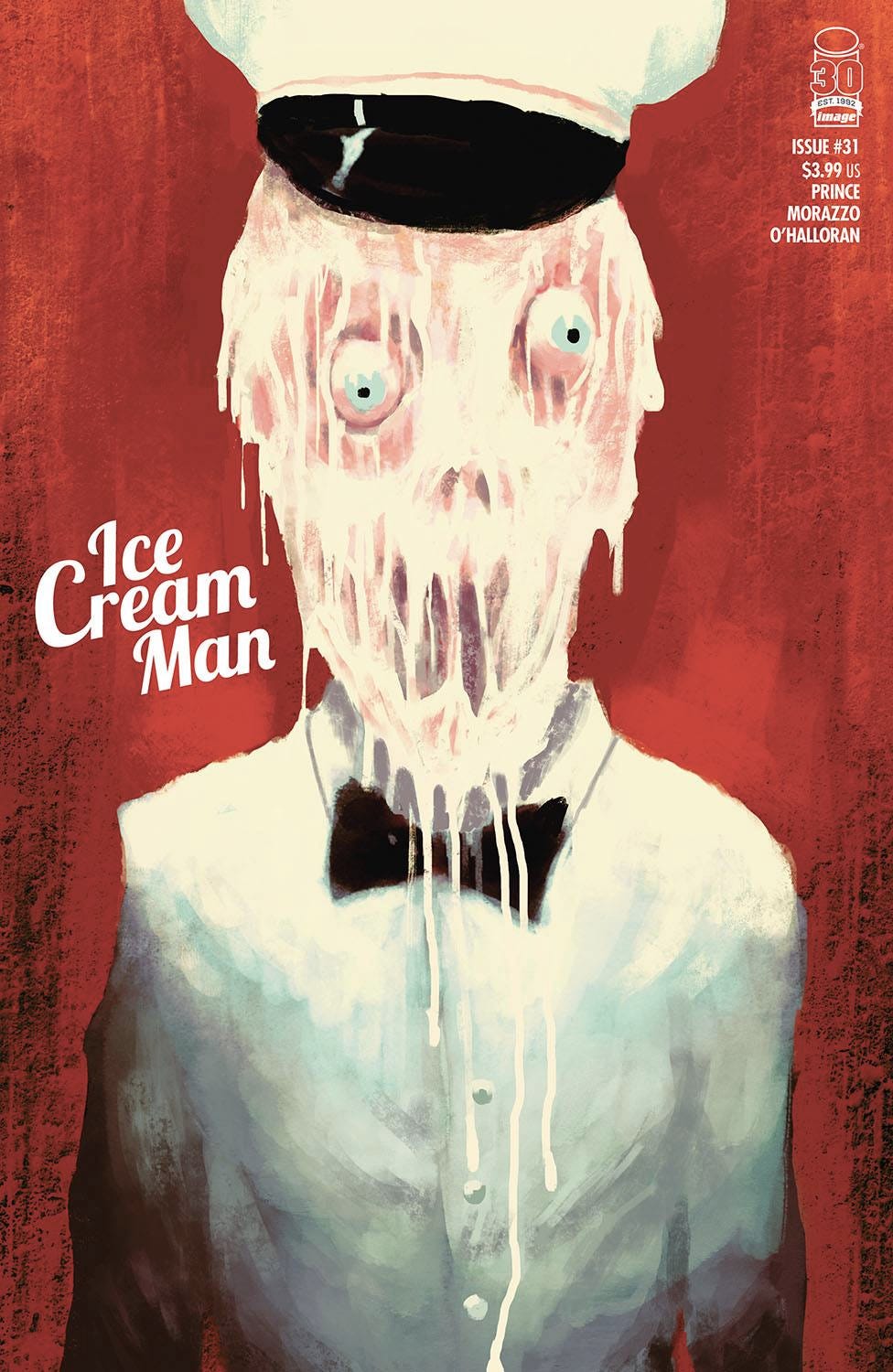The Case for Short-Form Storytelling
From a lover of short fiction

Last Saturday, I spent part of the afternoon taking my eight year old nephew to his first local comic book shop. Watching his eyes light up at the shelves and boxes holding thousands of single issues and hundreds of books with bright colors and heroic characters brought me back to high school Frank. My nephew loved the kids section that held titles like Sonic, Scooby-Doo, Batman, and Power Rangers. We spent a good amount of time pursuing the various titles and even made friends with the store owner who was a huge help for him finding the right books.
While I was looking for my own titles to purchase, I came across the third volume of Ice Cream Man written by W. Maxwell Prince with art by Martin Morazzo and Chris O’Halloran. I first picked up the earlier volumes back in 2019, then life got in the way (as it did for many of us) and I never went back to finish the series. Not for lack of interest, just simply the chaos of the last two - three years (new house, my extended family bunking with us for years, a global pandemic, baby, and two new jobs… chaos).
If you’re new to the series, I’ll give you a quick rundown of its premise - a series of one-shots (think short stories) about characters experiencing an onslaught of dread, existential horror, and strange occurrences that are tied together by the appearance of a sinister ice cream man.
Revisiting the series has been great fun, not only for my appreciation of all things science fiction, fantasy and horror, but for the storytelling device the series leans on: different stories about different characters with their own personal struggles that are somehow tied to this troubling figure. I’m only three volumes in and this has been such a treat (ha ha) to experience this comic so far. These stories are self-contained and do what it sets out to do by the end. After finishing it, I couldn’t help but think of my own love and affinity for short-form storytelling and why more people should explore it.
Long-form vs Short-form
Short stories have easily become one of my favorite mediums of storytelling. Reading masters of the craft, such as Edgar Allan Poe or Richard Matheson, is a joy to experience for their respective style and stories. I appreciate short-form, not just in prose or in a comic like Ice Cream Man, but in other forms of media such as Film and Television. As a matter of fact, it was not long ago when TV solely relied on episodic storytelling; somewhere down the road, there was a switch from short, self-contained stories with recurring characters dealing with their problems of the week, to longer, character-driven “arcs” that would span several episodes even whole seasons. From Police Procedurals on cable TV to Crime Serial Dramas on HBO, long-from storytelling took over TV and gave us the “visual novel”. Movie trilogies such as the original Star Wars, Lord of the Rings, or Back to the Future were not enough. Now we have the Marvel Cinematic Universe, where hundreds of characters feed into different worlds, adventures, and myths starting from 2008 and onward. We live in an age where most TV/Film/fiction is using long-form storytelling to the full effect.
Is this a bad thing? It’s not for me to say. My intention here is to shed light on the great fun in short, self-contained stories that can easily pack a punch the same way a novel can or TV series can.
“A short story is a love affair; a novel is a marriage.” - Lorrie Moore
Consuming vast amounts of pulp fiction really cemented my love for the short story and my own personal journey with the form. I came to realize that the short story often served as my introduction to some of my favorite stories and writers of all time. Most people when asked their favorite books usually name full length novels. Lately I’ve been reading almost exclusively short story collections.
Sometimes instead of getting lost in world-building, pages of character perspective, complicated plots and subplots, I’ll pull out a collection and rummage through the pages to find a random story that usually takes 10 maybe 15 minutes to enjoy. There is no better feeling to me than reading a short story when the day is done, the night has settled, and the house is asleep. This is not to cheapen the quality of the story just because it is brief. I’ve read plenty of stories that have made a profound impact on me. There are some that have moved me, surprised me, made me think, made me paranoid or frightened. Don’t let its length deceive you, the short story is not to be trifled with.
For me, the short story collection is a great way to test the waters with a new writer. If someone recommends an author, I will usually seek out a short story collection first before I try a novel. It was “The Masque of the Red Death” that introduced me to Poe’s work of the macabre in high school. Reading “Mars is Heaven” in a college science fiction class got me hooked on Ray Bradbury. Even a TV anthology series such as The Twilight Zone from the 1950s inspired me to pick up story collections from Charles Beaumont, Richard Matheson, and the show’s creator and host Rod Serling.
It’s one of these easiest ways to not only test an author but a genre as well. Louis L’Amour’s Frontier Stories Collections imbedded a hunger for tales of the old West and the mythology of the American gunfighter. Horror and Speculative Fiction work incredibly well in short-form. My wife grew up reading Scary Stories to Tell in the Dark with her sisters and friends, while the TV show Are You Afraid of the Dark was an absolute favorite of mine back in the day.
Short-form storytelling is accessible and fun to read. You will find stories that simply don’t speak to your taste. If that happens then you’ve only lost 10 minutes of your time. For me, it’s much worse when you find a writer you absolutely love. When you fall in love with a story, or a writer’s way with prose or their unique voice, you will be shilling out serious coin to snatch up every book they’ve written under the sun. Once you start, you’ll never want to stop. That’s what good short fiction can do to you. Hell, that’s what good fiction can do to you. This form of storytelling can turn your world upside down within minutes of reading. And if you are one of the poor souls that does not read fiction regularly, I implore you to pick up a collection of short stories at your local library or used bookstore and get to it!
We live in an age where the average attention span has been fried to bits by smartphones and social media. Investing in a short fiction volume is the first step into repairing the longterm damage.
Recommendations:
I leave you, dear reader, with a small list of recommendations for your readings pleasure. This is by no means an exhaustive list. If you’re new to reading short fiction, consider it a “starter pack” from some of my personal favorites.
The Horror Stories of Robert E. Howard (or any of Howard’s work)
The Best of Richard Matheson
The Collected Short Stories of Louis L'Amour, Volume 1: Frontier Stories
The Adventures of Sherlock Holmes by Arthur Conan Doyle
Perchance to Dream: Selected Stories by Charles Beaumont
Ghost Stories of an Antiquary by M.R. James
The Big Book of Adventure Stories edited by Otto Penzler
The Black Lizard Big Book of Pulp edited by Otto Penzler
The Collected Short Stories of Louis L'Amour, Volume 6, Part 1: Crime Stories
The Collected Short Stories of Louis L'Amour, Volume 6, Part 2: Crime Stories
Ray Bradbury Stories: 100 of His Most Celebrated Tales
Stories from the Twilight Zone by Rod Serling
Angry Candy by Harlan Ellison
Edgar Allan Poe Complete Stories & Poems
Complete Stories by Flannery O’Connor
Enjoy and ‘Til next time.




